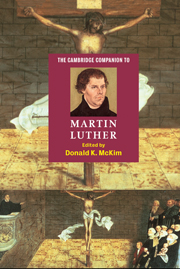Book contents
- Frontmatter
- Part I Luther’s life and context
- Part II Luther’s work
- 3 Luther’s writings
- 4 Luther as Bible translator
- 5 Luther as an interpreter of Holy Scripture
- 6 Luther’s theology
- 7 Luther’s moral theology
- 8 Luther as preacher of the Word of God
- 9 Luther’s spiritual journey
- 10 Luther’s struggle with social-ethical issues
- 11 Luther’s political encounters
- 12 Luther’s polemical controversies
- Part III After Luther
- Part IV Luther today
- Select bibliography
- Index
9 - Luther’s spiritual journey
from Part II - Luther’s work
Published online by Cambridge University Press: 28 May 2006
- Frontmatter
- Part I Luther’s life and context
- Part II Luther’s work
- 3 Luther’s writings
- 4 Luther as Bible translator
- 5 Luther as an interpreter of Holy Scripture
- 6 Luther’s theology
- 7 Luther’s moral theology
- 8 Luther as preacher of the Word of God
- 9 Luther’s spiritual journey
- 10 Luther’s struggle with social-ethical issues
- 11 Luther’s political encounters
- 12 Luther’s polemical controversies
- Part III After Luther
- Part IV Luther today
- Select bibliography
- Index
Summary
From Luther's own day to the present, critics have raised questions about the distinctively personal stamp given by the reformer to his theology. Despite its claims to biblical fidelity and universal validity, they suspected that Luther's legacy was the projection of one man's neurosis on to the whole of human history and at the expense of the relative tolerance and unity of the Western church. There is no denying that Luther was himself a prime example of the desperately bound sinner whose terrified conscience, hungry for the assurance of God's grace and the experience of its transforming power, became the test case for Lutheran proclamation.
Without lionizing Luther as some spiritual “Everyman” for all generations, one can conclude that in the course of his spiritual journey he spoke persuasively to and for many of his contemporaries. Luther boldly articulated and responded to the acute anxieties of the age through his campaign for the liberation of the church from its latter-day Babylonian captivity, his demand for the freedom of the individual believer’s conscience and the free rei¨gn of the Scriptures among the people, and his rejection of the ecclesiastical hierarchy in his appeal to the judgment of the common believer, that is, the baptized person who emerged from the waters of baptism the spiritual equal of priest, bishop, and pope.
- Type
- Chapter
- Information
- The Cambridge Companion to Martin Luther , pp. 149 - 164Publisher: Cambridge University PressPrint publication year: 2003



